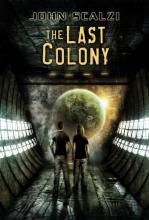John Scalzi - The Last Colony

"The Last Colony" returns to John Perry and Jane Sagan, retired from the military, as they colonize a new world.
The book is about secrets and peace. Readers of the first two books will know that secrets abound among the Colonial Union. However, in the first two books, the secrets were largely incidental. Yes, they played a major role in the plot, but the protagonists were happy to live their lives without confronting the secrets, so they weren't a big part of the story.
"The Last Colony" gives secrets a front seat. Pretty much every major event in the book comes as the result of a secret or its revelation. Characters debate about the ethics of keeping secrets. Sometimes they fall on the side of keeping secrets, sometimes on the side of revealing secrets, and sometimes on the side of allowing better choices even without full information. As a result, there is a rich discourse on honesty and its discontents. A side effect of this is that there are tons of exciting plot twists in the book, and all of them feel natural and well integrated into the story.
The theme of peace comes about through a larger debate on that one big secret that you learn about at the end of "Ghost Brigades." When a group is trying to push for peace, how can people tell that they're genuine and equitable? Where do a person's loyalties lie: with their country or their conscience? Is there such a thing as a just war? What about a just enforcement mechanism for peace? Where is the room for idealism in a harsh universe? John Perry, as an antiwar soldier who dislikes groups that threaten humanity and who dislikes warlike and secret elements of humanity, brings these questions to the forefront.
One thing that I liked a lot about "Old Man's War" and "Ghost Brigades" was that they felt finished after the end. To be sure, there were lots of things to come in future books and a lot left unsaid, but the significant events of the book felt concluded. In "The Last Colony," there is one very salient issue that comes up a few times throughout the book that is never satisfactorily addressed. Perry event talks with another character, and that character says that they haven't given the issue much thought, but then they don't give the issue more thought later on. I could accept that if I felt like it would be addressed in a future book, but since "The Last Colony" finished things up, it just feels like a loose end.
That said, the ending was superb. The series is nicely framed, I feel good about the state of the universe, and the goodness doesn't feel like an artificial Hollywood ending.



